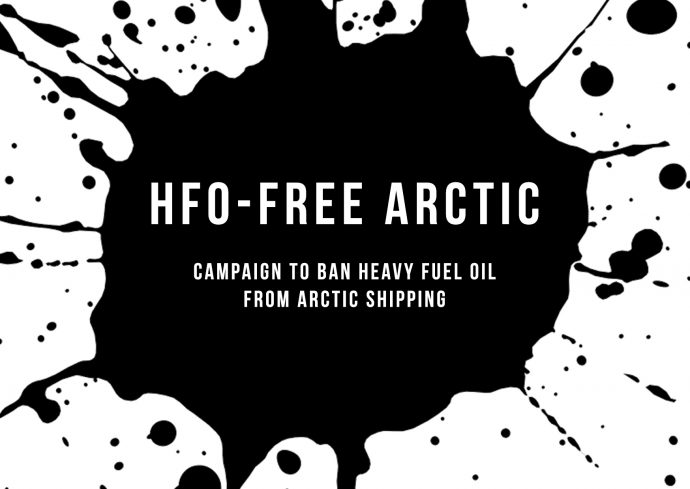Port of Rotterdam fuel oil spill – a stark reminder of risks to Arctic ecosystems
On Saturday 23 June 2018, a collision between a tanker and the jetty in the Port of Rotterdam – Europe’s biggest seaport, resulted in a heavy fuel oil (HFO) spill. Despite the immediate mitigation actions taken by the crew of the vessel and resources on-shore, 217 tonnes of HFO are estimated to have spilled from the fuel tank. “This is an environmental disaster for the local area and a stark reminder of the need to urgently ban the use and carriage of heavy fuel oil by Arctic shipping to prevent similar disasters happening in the Arctic”, said Dr Sian Prior, Lead Adviser for the Clean Arctic Alliance.
In media reports, a clean-up operation is underway and efforts are being undertaken to rescue oiled birds, but it seems likely that not all affected animals will be saved. The clean-up operation could take days if not weeks according to the Port of Rotterdam. Reports indicate that over 1,000 birds have so far been affected by the oil, including hundreds of swans which have been taken to a nearby bird sanctuary for treatment once the birds have been stabilised.
If such a disaster struck in the Arctic, it is unlikely that an adequate response could be put in place due to its remoteness. The limited availability of equipment and personnel to recover the oil, absence of safe holding or disposal locations for recovered oil, and complete absence of wildlife rehabilitation facilities mean that an effective response would be virtually impossible depending on the local conditions, oil spill response equipment might not be suitable, and oil could get stuck under sea ice and travel long distances before it seeps out again, with no prediction as to where that will happen. “A HFO spill is a tragedy anywhere in the world, and our thoughts are with those mounting the wildlife rescue and clean-up operations in the Netherlands”, said Dr Prior, adding that “this residue of the oil refining process should be banned for use in ecologically sensitive areas, including the Arctic in order to minimise the risk of environmental damage in the event of a spill”.
ENDS
Contact:
Sylvette Peplowski, Clean Arctic Alliance, +44 (0) 7789 390 360, [email protected]
About the Clean Arctic Alliance and Heavy Fuel Oil
The Clean Arctic Alliance is a coalition of 18 non-profit groups, campaigning for a ban on the use and carriage of heavy fuel oil (HFO) as fuel by ships operating in Arctic waters.
Heavy fuel oil is a dirty and polluting fossil fuel that powers ships throughout our seas and oceans – accounting for 80% of marine fuel used worldwide. Climate change is fuelling high winter temperatures and driving sea ice melt, opening up Arctic waters to shipping. As the sea ice recedes, larger, non-Arctic state-flagged vessels running on HFO are likely to divert to Arctic waters in search of shorter journey times. This, combined with an increase in Arctic state-flagged vessels targeting previously non-accessible resources, will greatly increase the risks of HFO spills. Currently , around 75% of marine fuel carried in the Arctic is HFO; with over half carried by vessels flagged to non-Arctic states – countries that have little if any connection to the Arctic.
Already banned in Antarctic waters, if HFO is spilled in cold polar waters, it breaks down slowly, proving almost impossible to clear up. In addition, unlike the waters of major international ports and busy coastal waterways, access to response facilities, equipment and personnel is virtually non-existent in the Arctic and there are no wildlife rehabilitation facilities. A HFO spill would have long-term devastating effects on Arctic indigenous communities, livelihoods and the marine ecosystems they depend on.
In February 2018, a dock at the southern end of Shuyak Island, Alaska, collapsed, causing a building and a container filled with oil to fall into the water, releasing an estimated 3,000 gallons of oil. The spill was located in critical habitat for marine mammals like sea otters and Steller sea lions. Responders collected more than 1,800 bags of oiled absorbent material. Ultimately, the spill cost $9 million dollars to clean up and the long-term environmental consequences of the spill remain unknown.
The International Maritime Organization (IMO) agreed in April 2018 to “on the basis of an assessment of the impacts, develop a ban on HFO for use and carriage as fuel by ships in Arctic waters, on an appropriate timescale”. The Clean Arctic Alliance welcomed this move, reiterating that a ban on the use and carriage as fuel by ships operating in the Arctic is the simplest and most effective way to mitigate the effects of HFO.
The Clean Arctic Alliance and expedition cruise ship operator Hurtigruten launched the Arctic Commitment – a commitment for businesses and organisations interested in the Arctic to end HFO use in the Arctic. As well as a number of Arctic expedition cruise operators and shippers, some ports in Iceland and Germany have signed it.

